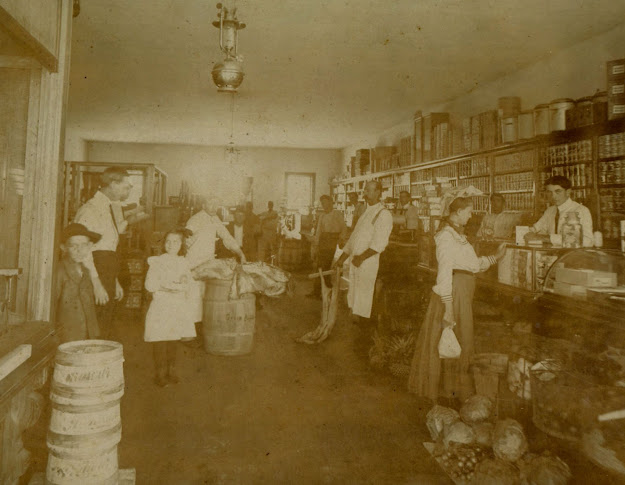Mr. Wotitzky was born October 26, 1840 in Prague, a city in the former Austro-Hungarian Empire which is now the capital of the Czech Republic. He spent his childhood in the Austrian capital of Vienna. His family background is unknown to modern historians, but may be considered relatively comfortable because after immigrating to New York City with his parents at age 15 he spent a number of years travelling throughout the country and living in a number of the larger cities. His educational background is not known, but certainly included more than basic literacy and the mathematical skills needed for business.
Jacob ended the first period of his travels in 1870 when, at the age of 30 he returned to New York City and married his cousin Rosa Frank. This was not uncommon at the time, particularly among immigrant families who came from close-knit backgrounds. To support his family Jacob began his business career selling general household goods from a push cart in New York, a common “start-up” practice for new merchants at the time. The difficulty of this work in both summer and winter is difficult for the modern imagination to comprehend but was not considered unusual in the post-Civil War period. Jacob was reportedly successful in this initial business venture, until a downturn in the economy occurred.
In the 1800's the United States experienced a “boom and bust” economy which makes today's economic downturns seem mild given that there was no social “safety net” prior to the institution of Social Security and related programs. In 1876 one of the periodic economic “panics” occurred which caused great economic and financial distress, and Jacob was one of its casualties. He lost his savings and was forced to leave New York City in search of other opportunities.
Jacob moved his family to Savannah, Georgia initially, and opened a general store, selling household goods, food, and clothing. The store was successful enough to provide the funds for Jacob to invest in rice farming in South Carolina, and he moved his family to the town of Walterboro, SC. This town is still in existence and is located about 50 miles west of Charleston. In the 1880's the area was not hospitable to outsiders of any type, but Jacob again is reported to have prospered in this venture. Unfortunately, malaria was still a major health problem in that area and Rosa Wotitzky suffered from it several times, and experienced several miscarriages as a result of the disease.
In 1886 Jacob heard about plans to build a new railroad to the southwest Florida coast terminating at the town of Trabue (our town, prior to its incorporation in 1887). Information about the healthful climate determined Jacob to move his family to the area for their health. It was usual in that period for a man to move to a new area to establish himself while his family lived with relatives until he could send for them. Jacob followed this practice, sending Rosa and her two surviving children to live with relatives in New York City.
Jacob opened a general store in a leased two-story building at the intersection of Marion Avenue and Sullivan Street. He lived over the store in another common practice of the day. His was the first general store in the town of Trabue, and it made accessible food supplies, household products, and tools which had previously been more difficult to obtain. The store apparently did well, but Jacob was cautious about the impact of a possible move on Rosa's health and that of the children and it was not until 1889 that he went to New York to move his family south. Family lore has it that he rented a railroad boxcar for the move.
The next step in the development of the family's business was a significant innovation in southwest Florida retail trade. Rosa and their son Edward took over responsibility for running the general store in town. Jacob bought a schooner (which he named the “Mollie O” after a cousin) which he fitted out as a floating store. With this vessel he traded among isolated coastal homes and settlements down the coast and around to what is now Miami. This service enabled him to bring goods to homes which lacked road access, and provided the basis for a trade in alligator hides, furs, bird plumes and salt fish which he sold to wholesalers. This seagoing retail service lasted into the 1940's under the management of Jacob's son Edward.
During the latter part of his life Jacob expanded his activities into homesteading. He began homesteading some 60 acres on Gasparilla Island. The laws of the time required a homesteader to improve at least three acres of his claim and live on the land for at least three months a year for the first three years of his claim. Jacob fulfilled the requirement by camping on ground which became what is now Boca Grande.
The last years of Jacob's life were filled with the everyday toil, challenges, and frustrations familiar to every small businessman. In 1903 he died from a stroke in the apartment over his store where he had lived a bachelor's life during the three years he was establishing his business and before he brought his family to live with him. He is buried in New York. His son Edward took over the store (which burned down in the Great Fire of 1912 which devastated the business district) and the schooner and entered politics as the Supervisor of Registration for Charlotte County. Edward's descendants became lawyers who are well known and respected among the County legal bar. The family's rise from the push-cart to the court room is a familiar American story of success over the generations. The role of Jacob Wotitzky in founding the family's fortunes on the basis of providing goods and services to those who needed and wanted them.
Mark Surrusco

No comments:
Post a Comment